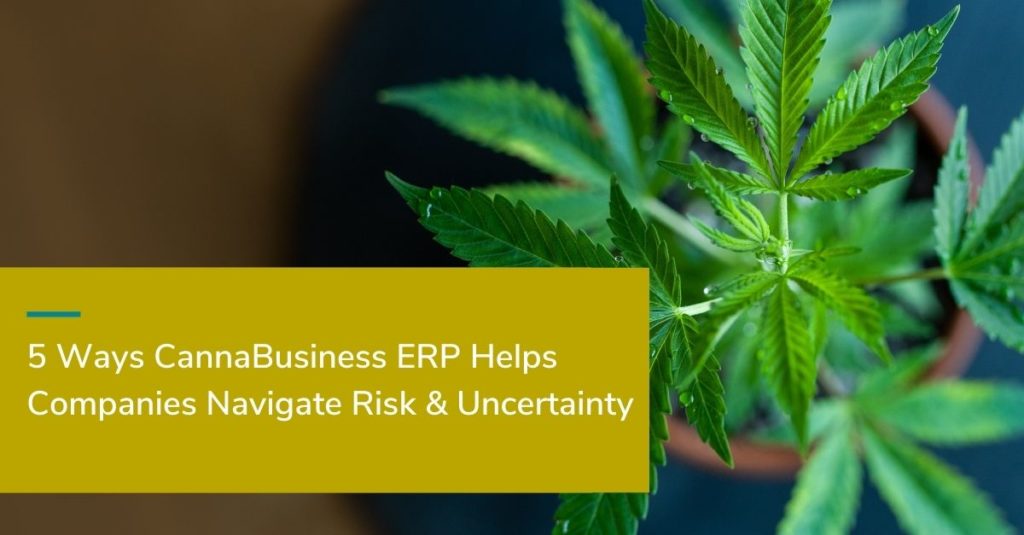
Risk and uncertainty have plagued cannabis companies since their operations began, starting with the fact that the US federal government and state governments are at odds regarding its legality. Illegal at the federal level, 18 states, Washington DC and Guam have all legalized cannabis in some form. Several countries, including Canada, Georgia, Malta, Mexico, South Africa and Uruguay, have also legalized the Schedule I drug for recreational use, while a number of other countries have legalized it for medical use.
With varying regulations, growing competition and an unknown—but exciting—future, the cannabis industry is not for the faint of heart. CannaBusiness ERP’s new guide, “Navigating Risk and Uncertainty in CannaBusiness,” unpacks the industry’s current top five uncertainties and explains how cannabis business software can help overcome them.
Uncertainty for the Cannabis Industry
Support for legalizing cannabis, whether for recreational or medical use, is at an all-time high. An April 2021 Pew Research Center survey reveals that a whopping 91% of US adults are in favor of it, with 60% saying “yes” to medical and recreational use and 31% saying “yes” just for medical use.
Cannabis businesses must draw strength from this support as they face the five top uncertainties addressed by the guide. Following is a brief look at the first three.
- Inflation and Rising Interest Rates
The operating costs for cannabis businesses are high. Labor, materials, technology, real estate, building materials, licensing/registration fees, utilities and more add up in a strong economy. Imagine how much more costly it is when inflation hits. Today’s cannabis businesses don’t have to imagine.
A Forbes Advisor article explains that inflation is here, why it’s here and how long it may be here. “Elevated inflation has been driven by supply chain disruptions and pent-up consumer demand for goods as the Covid-19 pandemic wanes. The hope is that should these issues resolve themselves, the Fed may not have as much work to do on the inflation front. But it’s looking more and more likely that high inflation will linger longer than desired.”
The concern for cannabis businesses that have been enjoying venture capitalist and private equity firm investments is that they may now have to fend for themselves. The guide notes, “This means dealing with inflation, the subsequent rise in interest rates and more expensive loans. And because the cannabis industry is not legal federally and Congress has not passed the Secure and Fair Enforcement (SAFE) Banking Act, your access to banks, loans and tax deductions is either non-existent or severely limited.”
As uncertainties go, this one has some teeth.
- Climate Change Unpredictability
Concern over climate change is nothing new, but the cannabis industry is uniquely affected by the climate’s unpredictability. Tornadoes, hurricanes, wildfires, early freezes and droughts produce a number of changes cannabis cultivators, manufacturers and distributors will need to address, including shifting temperature and soil changes, greenhouse destruction from severe storms and water shortages.
- Rising Taxes
Like inflation, rising state taxes are threatening cannabis business profitability. In fact, businesses in the cannabis industry are taxed more heavily than in the alcohol industry. A Forbes article explains that states that allow “adults 21 and over to use cannabis without fear of jail, cannabis tax revenue far, far exceeds alcohol tax revenue.” Rising taxes and unfortunate IRS tax codes, such as section 280E (explained further in the guide), contribute to the uncertainty felt by cannabis businesses across the nation.
Navigating Risk and Uncertainties with CannaBusiness ERP
The guide digs into the risks and uncertainties facing the cannabis industry and includes a look at the evolving legal and regulatory landscape. The guide also examines the changing competitive landscape. “During its beginning stages, a competitive spirit pervaded the cannabis industry, but there was also a collective desire to further the mission of legalization, to help people and to end the stigma associated with cannabis consumption and selling. The nature of the competition has altered as the industry has grown.”
With global cannabis sales expected to reach–and bypass–the $35 billion mark in 2022 and exceed $61 billion by 2026, smaller, independent cannabis businesses may be convinced to stay in the fight. Even better, they won’t have to do it alone.
CannaBusiness ERP, cannabis business management software built in Sage X3 and configured by NexTec industry experts, delivers industry-specific capabilities within a single solution. It’s designed to facilitate finance and operations, governance and compliance, seed to sale, product recall readiness and distribution and inventory management needs.To learn how cannabis ERP can help alleviate the uncertainties in today’s cannabis industry, download the guide and reach out to NexTec’s experts. We’d love to chat.
